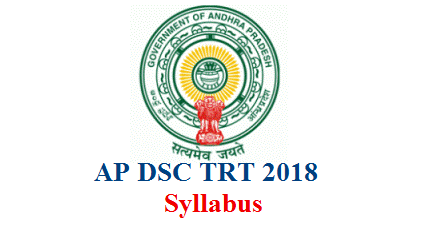AP TET cum TRT 2018 Post wise Syllabus Download
AP DSC Notification 2018 has been issued by the Andhra Pradesh Govt to fill up SGT School Assisstants Language Pandits Physical Education Teacher Posts in School Education Department. Detailed Notification contains Post wise eligibility Educational Qualifications Professional Qualifications Post wise Syllabus Exam Dates complete Schedule for the Notification
Government of Andhra Pradesh Department of School Education
State Council of Educational Research & Training DSC ` SGT – SECOND GRADE TEACHER SYLLABUS
1. G.K & current Affairs – – 10M
2. Perspectives in Education – 05M
3. Educational Psychology – 10M
4. Content & Methodologies – 75M (50+25)
Total – 100 M
PART – I
I. General Knowledge And Current Affairs (Marks: 10)
PART – II
II. Perspectives In Education (Marks: 05)
1. History of Education :
• The Education in Ancient India – Pre-Vedic and Post-Vedic period, Medieval Education.
• Education in Pre Independent era – Woods Despatch (1854), Hunter Commission (1882), Hartog Committee (1929), Sargent Committee (1944).
• Education in Post Independent era – Mudaliar Commission (1952-53), Kothari Commission (1964-66), Ishwarbhai Patel committee (1977), NPE-1986, POA- 1992
2. Teacher Empowerment:
• Need, interventions for empowerment, Professional code of conduct for teachers, Teacher motivation, Professional development of Teachers and Teacher organizations, National / State Level Organizations for Teacher Education, Maintenance of Records and Registers in Schools.
3. Educational Concerns in Contemporary India:
• Democracy and Education, Equality, Equity, Quality in Education, Equality of Educational opportunities.
• Economics of Education, Education as Human Capital, Education and Human Resource Development, Literacy – Saakshar Bharat Mission.
• Population Education, Gender – Equality, Equity and Empowerment of
Women, Urbanization and migration, Life skills.
• Adolescence Education
• Value Education – Morel Value and Professional Eathics in Education.
• Health and Physical Education
• Inclusive Education – Classroom Management in Inclusive Education
• Role of Education in view of Liberalization, Privatization and Globalization
• Programmes and Projects – APPEP, DPEP, Sarva Siksha Abhiyan, National Programme for Education of Girls at Elementary Level (NPEGEL), Rashtriya Madhyamika Siksha Abhiyan(RMSA), Rashtriya Aveshekar Abhiyan (RAA), KGBVs, Model Schools.
• Incentives and special provisions – Mid Day Meals, Free Books, Scholarship, Awards, Welfare Hostels, Transportation.
• Current Trends in Education – Badi pelusthondi, Badi ki Vasta, Mavuru – Mana Badi, Vidyanjali, Swacha Patasala, Inspire, Kalavutsav.
4. Acts / Rights:
• Right of Children to Free and Compulsory Education Act – 2009
• Right to Information Act – 2005
• Child Rights
• Human Rights.
5. National Curriculum – Framework, 2005: Perspective, Guiding Principles, Learning and Knowledge, Teaching Learning Process, Assessment, Systemic Reforms.
PART – III
III. Educational Psychology – 10Marks
1. Development of Child: Development, Growth & Maturation – Concept & Nature. Principles of development and their education implication. Factors influencing Development – Biological, Psychological, Sociological, emotional. Dimensions of Development and their interrelationship – Physical & Motor, Cognitive, Emotional, Social, Moral, Language relating to Infancy, early Childhood, late Child hood, Adolescence. Understanding Development – Piaget, Kohlberg, Chomsky, Carl Rogers, Erikson.
2. Individual differences: Inter and intra individual differences, meaning, nature and theories of intelligence with special emphasis to multiple intelligence, IQ, assessment of intelligence, EQ, Creativity. Attitude, Aptitude, Interest, Habit and its Influence on Intelligence – Class room implementation.
3. Learning: Theories and approaches of learning, learning curves, Factors, Phases, Dimensions of learning, Types of learning, Transfer of learning. Memory, Forgetting, Learning and assessment– Class room implementation – Children with special need – Inclusive Education.
4. Personality: Nature, characteristics and theories of personality, factors of Personality, Assessment of Personality, Mental health, Adjustment, Stress – nature, Symptoms and management. Emotional intelligence, Management of emotions – Class room implementation.
Telugu: – Content: 10

